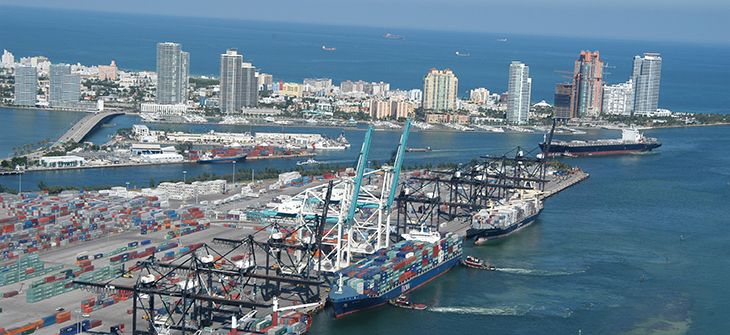- FG Plans Massive Export With Lekki Deep Seaport
The Federal Government has announced plans to embark on massive exportation of goods using the Lekki Deep Seaport when it becomes operational in 2021.
Vice-President Yemi Osinbajo stated this on Thursday while inaugurating the Lekki Deep Seaport project in Lagos.
He explained that the development of the Lekki Deep Seaport was critical to the creation of special economic zones, which would serve as models for others across the country.
He said, “In the past two budgets, we have provided an average growth of N90bn for development of SEZs and we are developing the special Lekki economic zone as a model for other economic zones specifically targeting export.”
He noted that the ceremony was a landmark event towards driving the Federal Government’s Economic Recovery Growth Plan and the present administration’s emphasis on supporting game changing infrastructure projects directed at making major impact on trade and commerce
He said, “We were told by the promoters of this project that they are targeting about 1.5 million 20 feet equivalent unit container capacity annually, which we expect to grow to about 2.7 million and 4.7 million TEUs when the project operations commence. With this feat, the Lekki Deep Seaport will be one of the largest deep water seaports in our region and serve as a hub for port operations in the whole of West Africa.’
“We have been told that very large crude carriers will now be able to visit the port and greater efficiency and economies of scale will generate significant economic revenue for the Nigerian economy with the Federal Government earning a significant portion.”
According to him, the event was also a reflection of the government’s commitment to economic philosophy to private sector leadership to achieve economic development, stressing that the business of government is to contribute by way of equity where necessary, but more importantly, create the enabling environment for the private sector to do business.
“We must move ahead with ensuring the speedy completion of this project; there will be problems, but we assure you that the federal and state governments will be with you every step of the way to ensure that we give all the support required to make this dream come to fruition,” he stated.
Earlier, the Lagos State Governor, Akinwumi Ambode, represented by the Deputy Governor, Lagos State, Idiat Adebule, said the maritime sector had the potential to become a major revenue earner with significant contribution to the Gross Domestic Product of Nigeria.
He said the Lekki Deep Seaport had an adequate space for container storage with modern equipment to facilitate port operations and would tremendously relieve Apapa and Tincan ports of pressure.
He said the port would impact greatly on the development of the Lekki free trade zone while also commending the promoters of the project for their confidence in choosing Nigeria as an investment destination.
The Minister of Transportation, Rotimi Amaechi, said the Lekki seaport would be the first deep seaport in Nigeria and give the country the ability to receive very large crude carriers.
He added the ability to accommodate large vessels would the nation a regional hub.
“I hope this would help us generate outward cargoes because we have been having problems in raising outward cargoes. We must also work hard to make sure that we send out commodities to other countries.”
The Managing Director, Nigerian Ports Authority, Hadiza Usman, said the project was in line the with Federal Government’s commitment to promote private investment.
She said that the NPA fully paid share capital of five per cent, which was the minimum investment enough to give the private investor confidence, without having undue interference as a regulator.
She said the vision of the NPA was to provide an enabling environment for the operators, stressing that Nigeria being the largest exporter and importer of cargo in West Africa subregion required a deep seaport, which would receive large vessels.
“These big ships move cargo more efficiently. We will work with all stakeholders to see the deep seaport become a world-class facility,” she said.
The Managing Director, Tolaram Group, Haresh Aswani, said the project would change the future of the nation’s maritime sector and serve as a catalyst for economic development and the general well-being of Nigerians.
He said when completed, it would create about 170,000 direct and indirect jobs while also generating about N360bn under the concession including over N200m in tax revenue for both the Lagos State Government and Federal Government.

 Billionaire Watch3 weeks ago
Billionaire Watch3 weeks ago
 Startups4 weeks ago
Startups4 weeks ago
 News4 weeks ago
News4 weeks ago
 News4 weeks ago
News4 weeks ago
 Bitcoin4 weeks ago
Bitcoin4 weeks ago
 Naira4 weeks ago
Naira4 weeks ago
 Forex3 weeks ago
Forex3 weeks ago
 Treasury Bills4 weeks ago
Treasury Bills4 weeks ago

























